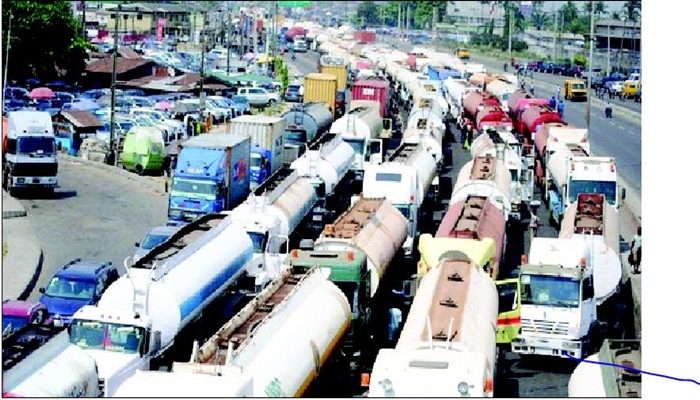
President Muhammadu Buhari has expressed concern over the persistent gridlock in Apapa, Lagos State.
The president made his feelings known when he received the leadership of Lagos Chamber of Commerce and Industry (LCCI) at the Presidential Villa, Abuja on Wednesday.
He, however, expressed optimism that the problem would soon be resolved as the Federal and Lagos State Governments were working together to bring an end to the problem.
“I must admit the Apapa gridlock still remains a challenge. It saddens me that businesses have had to suffer as a result of this.
“We are doing our very best working with the Lagos State Government to bring an end to this issue,’’ he said.
Buhari also reassured Nigerians that his administration would continue to support the private sector to flourish and create more jobs in the country.
He revealed that the Federal Government had invested heavily in infrastructure development, and also supported development banks to provide loans to traders and small enterprises.
“In the last four years, we have invested heavily in infrastructure development.
“We supported our development banks to provide loans to traders and small enterprises.
“We signed executive orders to support local content consumption. We also focused on enhancing the Ease of Doing Business to facilitate investment.’’
He said that the Federal Government also aligned with the monetary authorities which had significantly contributed to the successes recorded.
On the recently signed African Continental Free Trade Agreement (AfCFTA), Buhari said the consultative approach Nigeria took on the Free Trade Agreement was just another example of government’s desire for sustainable and inclusive growth.
He said that the consultative team had visited all the geopolitical zones, and met with farmers, commodity traders, manufacturers, bankers and stock brokers, adding “we listened and made note of their views.
“Our studies revealed that although the services sector was doing okay, other key job creating sectors such as manufacturing and processing were still lagging behind.
“This is evident by the fact that intra-African trade only accounts for 14 per cent of Africa’s total trade. As a continent, our consumption is mostly of goods imported from outside the continent.
“We viewed this as both an opportunity and a threat. It is an opportunity as Nigerian manufacturers can aggressively expand to meet the huge demand across the continent.
“It is a threat as one can abuse the rules of origin to flood the market with imports from outside the continent, thereby destroying jobs here at home.’’
He, however, said that Nigeria’s engagement in the next phase of the negotiations would ensure that proper safeguards were put in place to support African manufacturers.
“We shall continue to count on your support to ensure this goal is achieved,’’ he added.
Earlier, the President of the Lagos Chamber of Commerce and Industry, Mr Babatunde Ruwase commended the president for signing the AfCFTA.
He also requested that the Lagos Chamber of Commerce and Industry, which he described as the oldest in the country, be regularly invited to “state functions that are business and economy related.’’






